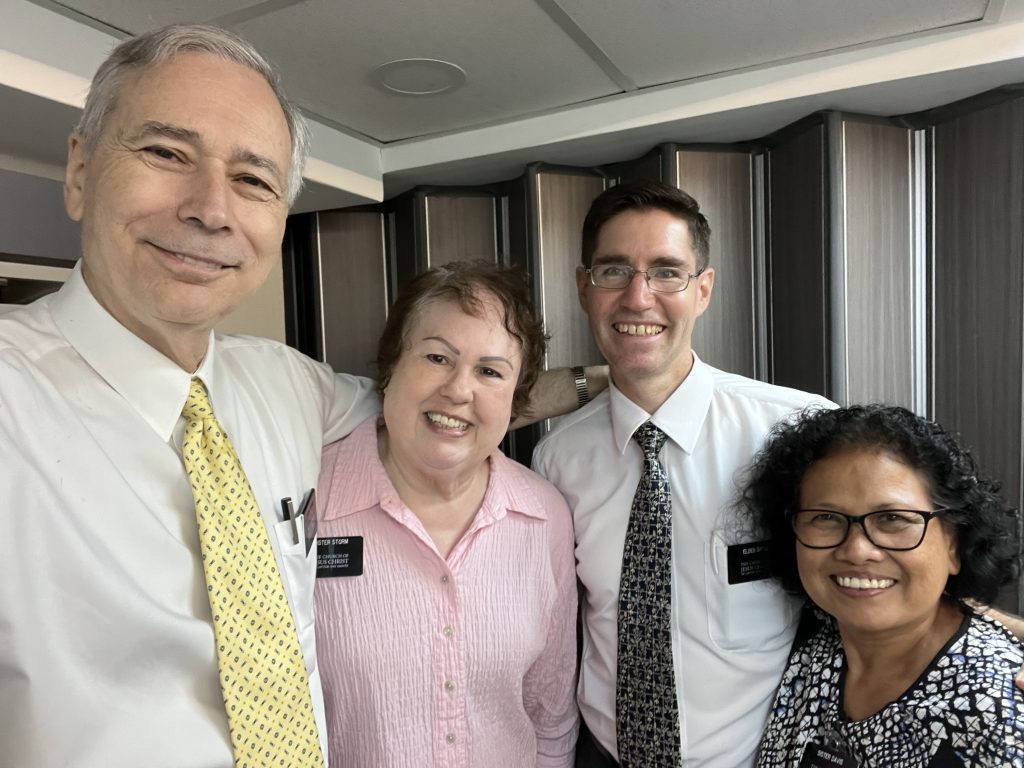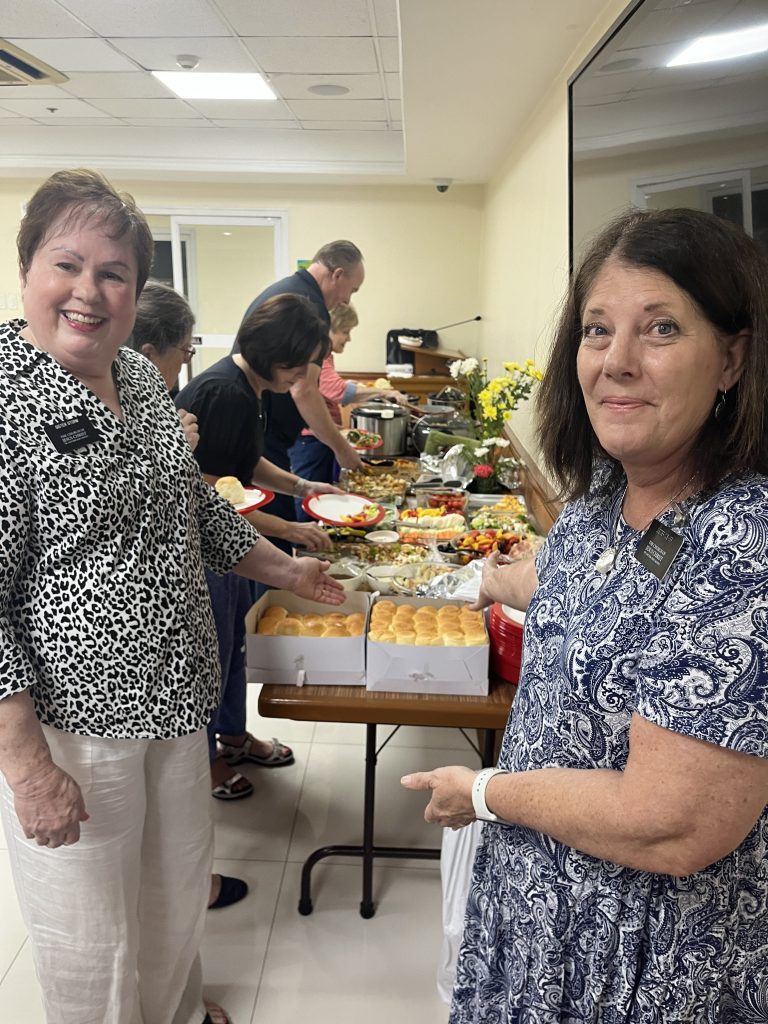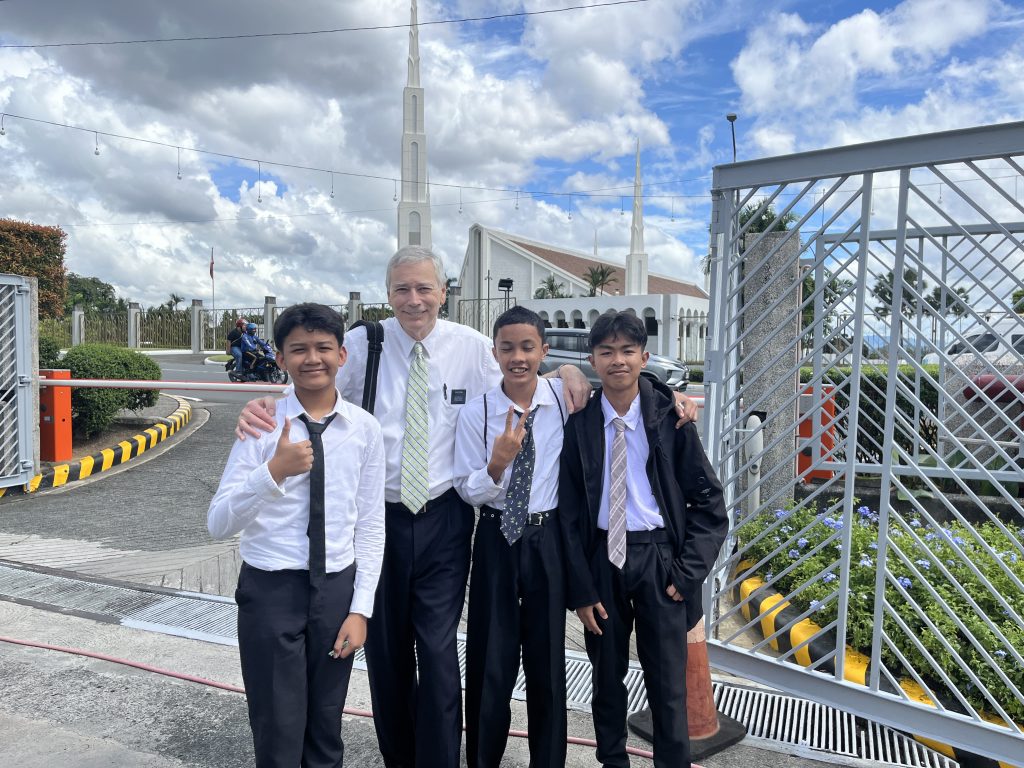Recently, we had the opportunity to record an oral history of a faithful and somewhat remarkable Filipino saint – Sister Conchita dela Cruz Davis. As I’ve mentioned several times, listening to stories of these Filipino saints’ stories who have been faithful in the face of considerable opposition, financial hardships, and in some instances being shunned by their families is a humbling experience as compared to my challenges. Here’s a big picture overview of her story.
Sister Conchita Davis was the tenth of thirteen children and lived in a rural area north of Manila. Her family were faithful Catholics, had family prayers twice daily, and routinely attended mass. Her older brother began taking missionary lessons while attending law school. Initially, his primary interest was to improve his English. However, the more he learned, the more intrigued he became and this began a slow process that took decades but eventually one by one members of her family eventually joined the Church.
When Sister C began attending church, the church meeting house was a small home vs. the large Catholic church that her family attended. She was a star student in the Catholic school that she attended and teacher’s favorite. When asked about her attendance at another church, she was openly ridiculed by her Priest for her decision.
Her father refused to take her newfound religious enthusiasm seriously and when she requested his permission to be baptized, he flatly refused to give his permission. She persisted pestering her father for the next several years but her father continued to refused to grant his consent. Undeterred, she just soldiered on. As she approached her eighteenth birthday, when she could make her own decision, her father finally relented and said, “You just aren’t going to give up are you?”
After graduating high school, she attended a University in Manila earning a midwife degree. Prior to graduating with her degree, she began to consider serving a mission. When she told her father, who was financially supporting her education about her thoughts about servicing a mission, he was less than pleased. When a mission call came, she told her father and his reaction was much more severe than she anticipated. He was livid and replied that if she served a mission; she would be cut off financially making it impossible for her to continue her education after her mission. This was unanticipated and she spent a few days considering what to do.
After careful thought and prayer, she forged a head and accepted her mission call and was assigned to serve in the Cebu Philippines Mission. After her mission, without financial support from her father she was unable to continue her education and took a job as a nanny. A few months later her stake president called her to serve a full-time service mission (which is not a proselyting mission but one of service) – of course, this mission call had no compensation. Without hesitation, she accepted the one-year call for this service mission.
Her first assignment was to serve in the Philippines Indo-Chinese Refugee Camp serving refugees fleeing communist persecution in Vietnam, Laos, Cambodia, and surrounding countries. These refugees became known as “Boat People” because they fled oppressive communist regimes by overloading small boats and sailing/rowing to the Philippines and neighboring islands. Many didn’t survive this journey. Those that did and made it to the Philippines were placed in refugee camps.
Her role in the refugee camp was to teach life skills, English, and hygiene to these refugees as they waited, sometimes for years, to be given permission to immigrate to countries around the world, including the US. A side note, the Oakland California Stake, where we lived for over twenty-five years, was a part of this refugee story since many of these refugees (some from this very refugee camp) settled in the Oakland California area. Thousands of these refugees began to attend church at LDS chapels in the Oakland area including those next to the Oakland Temple. To support these refugees, that included Vietnamese, Laotian, Cambodian, Chinese, and other nationalities, branches were organized. Years later Marcia and I would serve for six years in inner-city Oakland as service missionaries where many of these refugees lived. But, I digress.
As a result of her service mission at the refugee camp and other service she rendered over the next few years, she made the acquaintance of a military family at the Subic Bay military base in Luzon which was located north of Manila. After this family returned to the states after their military service had ended, they contacted Sister Conchita and offered to sponsor her visa application so she could continue her education at BYU Provo. She accepted this invitation and with only a few dollars in her pocket she boarded a plane and flew to Utah. To support herself, she was able to secure a position at the Provo Mission Training Center (MTC) teaching Tagalog to missionaries that were called to serve in the Philippines as she pursued a college degree.
While teaching at the MTC in Provo, she met a returned missionary from the Philippines who was also teaching Tagalog in the MTC, and (as they say) the rest is history, and she married this former Tagalog speaking returned missionary. After her husband graduated, they moved to Philadelphia where he attended Optometry school. After graduating, they opened an Optometry office in New Mexico and recently retired. The first thing they did after retiring was to apply to serve as a senior missionary couple (one of the younger couples being in the fifties) and are currently back in the Philippines serving in the Olongapo (not too far from Subic Bay) Mission Office. With their language skills, they offer a different level of expertise in their mission service than boneheaded English speaking senior couples like us.
The primary reason for interviewing Sister Davis was to record her experiences and insights of missionary service in the refugee camp as well as her involvement in establishing several church groups in the area where she lived before and after her first mission to Cebu. During her second mission as a service missionary in the refugee camp, she was one of nearly one hundred sister missionaries that served in this refugee camp during the time the camp was in existence.
Because the refugee mission service was a mission focusing on charitable service, it had much profound impact on the temporal aspects of peoples lives as they learned skills that they would need after they were relocated. Sister Davis said this experienced changed her life. She broke into tears as she shared some of her experiences at the camp and some of the hardships these refugees experienced. The most heartbreaking story she shared during her interview was how many of these refugees were forced to watch their mothers, fathers, cousins, and siblings murdered in front of them by their communist overlords. Talk about PSD.
My big takeaway from this interview, other than the scope of the different types of service in the Church’s missionary program, is if you are faithful and continue to move forward in unshakeable faith in the Lord Jesus Christ, He will lead you to where He wants you and where you need to be. Sister Davis is a case in point because she never lost faith in the face of challenges and opposition.
Validating the premise of living by faith is the fact that she eventually ended up at BYU where she would meet and marry her eternal companion and is now back in the Philippines serving yet another mission. This mission service ends in a few months at which time she and her husband will return to the US and split their time between the US and the Philippines – they have a home in each country.
The big takeaway for me about her story is that she walked away from a guarantee for a fully paid university education to serve a mission. Since the Lord always sees the big picture and had other plans for this faithful sister, what may have at the time seemed like a poor decision from the perspective of the world, turned out to be a decision that would put her on a path that completely changed her future life but at the time it was (what I would call) a gutsy decision. Faith always precedes miracles.

Thanksgiving in the Philippines
There is no comparable holiday in the Philippines for Thanksgiving as there are for other holidays such as Halloween or Christmas. However, that didn’t deter the senior missionary couples from hosting a Potluck Thanksgiving Feast with most of the traditional items that are normally served at a Thanksgiving Dinner – although some of the items were difficult to come by and had to have close to but not exact foods.

Marcia and Sister Meyer – who has become one of her best friends over here. Elder and Sister Meyer’s assignment is a Member & Leader Support mission
Future Filipino Missionaries
The other day as we were arriving at the Area Office, there was a group of young people walking through the parking lot. They stopped to ask me where the Distribution Center (a place to purchase church related items such as literature, temple clothes, and scriptures). I pointed it out to them and gave them directions.
I then asked why they were at the Area Office. They told me that they had come on a temple trip from the provinces – a five hour trip one way – to do temple baptisms.
I offered to take them on a tour of the MTC and Area Office. For the next thirty minutes I took these young men on a tour visiting the Area President’s Office stopping at the travel office explaining when they go on their missions (they said they were of the MTC Class of 2026 and 2029) this is where their travel arrangements would be made and their passport/visas issued – if they served outside of the Philippines, our office, and all of the other offices introducing them to people as we walked through the building.
We ended up at the Distribution Center. I told them I would purchase each of them a hardcopy of the scriptures – Old/New Testament, Book of Mormon, and Doctrine and Covenants if they promised me that they would read for five minutes a day until they returned to enter the MTC. They readily agreed.
They got their new scriptures, the first they ever had, they walked off excitingly leafing through their new scriptures.

Future missionaries with the Manila Temple in the background
Learning more about the Philippines….
In the US there are Jack-in-the-Box fast food restaurants. In the Philippines, there are Rice-in-a Box restaurants.

Bonifacio Day
I am posting this blog entry on Bonifacio Day which is a national holiday in the Philippines. It commemorates Andrés Bonifacio, one of the country’s national heroes. He was the founder of a secret society that triggered the Philippine Revolution of 1896 against the Spanish occupation. The holiday is celebrated every November 30, the birth anniversary of Bonifacio.
One thing I’ve come to understand is that the Filipinos are fond of their holidays of which there are many. As in the US, the holidays are often moved from their official date of the holiday to a Friday or Monday to make a long weekend. The difference between here and the US is that the announcement of the change is often a week or two before the change. We only found out about the change less than a week ago.
Thought of the day: Sometimes everything is the same but completely different.
Scriptural thought: 3 John 1: “I have no greater joy than to hear that my children walk in truth.”
